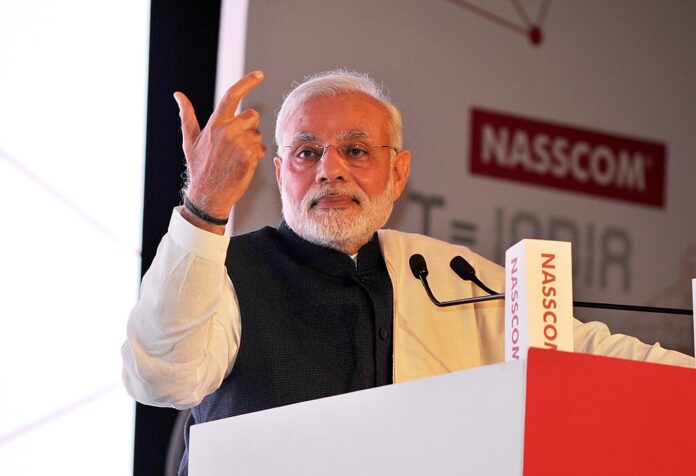Indian Prime Minister Narendra Modi and Russian President Vladimir Putin hold talks on the Russia-Ukraine conflict, with Modi sharing insights from his recent Kyiv visit and reiterating India’s commitment to diplomacy
Indian Prime Minister Narendra Modi and Russian President Vladimir Putin engaged in a significant phone call on Tuesday, focusing on the ongoing Russia-Ukraine conflict and India’s role in facilitating peace. The discussion came just days after Modi’s visit to Kyiv, where he met with Ukrainian President Volodymyr Zelenskyy.
During the call, Modi shared his observations and insights from his recent Kyiv visit, emphasizing India’s readiness to support diplomatic efforts aimed at resolving the conflict. Modi’s visit to Kyiv on August 23 marked a historic diplomatic step for India, showcasing its active involvement in global peace efforts. Modi had urged Zelenskyy to engage directly with Putin to seek a resolution, highlighting the importance of dialogue over military solutions.
Embed from Getty ImagesThe Kremlin responded to Modi’s call by providing a “fundamental assessment” of the conflict, detailing Russia’s perspectives and proposed approaches for resolution. Putin expressed concerns about what he described as the destructive stance of Kyiv and its Western supporters. He reiterated Russia’s positions and suggested potential pathways to address the ongoing crisis.
Modi’s remarks on social media after the call underscored his commitment to a peaceful resolution. He emphasized the importance of dialogue and diplomacy, reaffirming India’s dedication to supporting an early and lasting settlement. The Prime Minister’s Office noted that Modi and Putin also reviewed progress on bilateral issues, including trade and economic cooperation, following Modi’s visit to Russia in July. They expressed satisfaction with their ongoing collaboration within the BRICS framework and agreed to maintain communication at various levels.
In his conversation with US President Joe Biden, Modi had previously highlighted the significance of his diplomatic visits to Poland and Ukraine. The White House praised Modi for his efforts to promote peace and support Ukraine, reaffirming the US commitment to a resolution in line with international law. Modi’s proactive engagement reflects India’s strategy of leveraging diplomacy to influence global conflicts while reinforcing its relationships with major powers.
Analysis:
Political:
The conversation between Modi and Putin highlights India’s growing role in global diplomacy and conflict resolution. Modi’s direct engagement with both Russian and Ukrainian leaders demonstrates India’s strategic positioning as a mediator in international conflicts. This approach aligns with India’s broader foreign policy goals of enhancing its influence on the global stage while advocating for peaceful solutions. Modi’s diplomacy contrasts with the more confrontational stance of other major powers, reflecting India’s preference for dialogue over escalation.
Social:
Modi’s diplomatic efforts mirror broader societal debates about the role of emerging powers in global conflicts. India’s proactive stance in seeking a resolution to the Russia-Ukraine conflict aligns with its growing global influence and its commitment to humanitarian principles. The emphasis on dialogue and diplomacy reflects a societal preference for peaceful solutions to conflicts, contrasting with the more militaristic approaches of other nations.
Modi’s engagement with both Zelenskyy and Putin also highlights the global community’s expectation for emerging powers to contribute to resolving major international crises. This approach resonates with societal values of cooperation and mutual respect, reinforcing the idea that diplomacy is a crucial tool for addressing global challenges.
Racial:
While the immediate context of Modi’s discussions does not directly address racial issues, the broader implications of global conflict resolution can impact diverse communities worldwide. The emphasis on dialogue and peaceful resolution can contribute to reducing the displacement and suffering experienced by individuals affected by the conflict. Additionally, the involvement of emerging powers like India in mediating international conflicts can influence perceptions of global leadership and solidarity, impacting how different racial and ethnic groups view the role of major powers in addressing global issues.
Gender:
The impact of Modi’s diplomatic efforts on gender issues is less direct but still significant. Peaceful resolution of conflicts has the potential to improve conditions for women and families affected by the crisis. Women often bear a disproportionate burden in conflict situations, and diplomatic efforts aimed at achieving peace can contribute to stabilizing regions and improving the safety and well-being of women and children. Additionally, the increased recognition of women’s roles in diplomacy and conflict resolution underscores the importance of inclusive approaches to global peace efforts.
Economic:
The resolution of the Russia-Ukraine conflict has significant economic implications, affecting global markets, energy prices, and trade dynamics. Modi’s diplomatic efforts aim to mitigate the economic impacts of the conflict by promoting dialogue and stability. The potential for peace can lead to improved economic conditions, including reduced disruptions in global trade and energy supplies. Modi’s focus on diplomatic solutions reflects a broader recognition of the economic costs of prolonged conflict and the benefits of achieving stability through negotiation.
